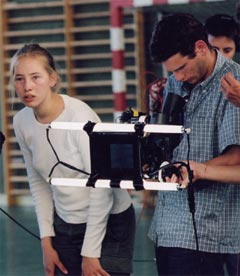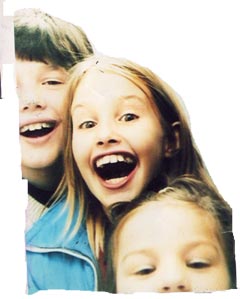English Page
(traduction : Oona Bijasson)
 Answering someone...
Answering someone...
She says : " It' s in spite of or thanks to" if I ask her how and why she became an actress so soon. To make this film "Half-price", to construct it this time she says that it's what she has liked best up to now in her short lifetime, but that thanks to her work as an actress, she was able to find that grace to make her film. She plays with words : in French, "grace" and "garce" (" bitchy ") sound weirdly alike, so "does one need to be bitchy to find grace? I don' t know, I'm not experienced enough neither in grace nor as a bitchy. But I would tend to believe that what' s beautiful is rather stolen, or hidden, in any case secret.
Have a look, I say, she does so, and : No, no, this is too nice, it' s not what I' ve liked best in my lifetime " not so short " to make this film...
And this is not about the film.
The film, then, Half-price.
I was sixteen when I started writing a script. When I was through with it, four months later, I gave it to two producers to read. The first one liked it but he wanted to have it made by somebody other than me.
The second one didn' t reply. I decided to make the film at once. I created the sets at home, in my bedroom, where I lived with my brother.
The younger of the two girls, I met her at my niece' s birthday, her name's Cindy, she was dancing alone almost in the dark , like a crazy girl, and I danced with her, she had an amazing strength in her arms and body, incredible in her tiny slender body. Wherever she is, her own world is always with her, a transparent bubble.
She needs nobody but still everybody. She' s a toughie.
I like that toughie sile in people I love.
The elder of the two girls, Lila, she' s a princess. She' s toughie too, she' s very beautiful and she knows it.
The boy, Kolia, in real life he's my younger brother. He' s very courageous and generous. When we shot a scene under water, it was icy cold, he nevertheless went on swimming. Some people called the police, he swam until the police arrived.
I could put them into any situation, they knew, they guessed, they imagined the challenge, what to do and say.
 My elder brother was the cameraperson . We finished the shooting in Blois. I had won the Emergence competition to shoot two scenes with the normal crew of a normal shooting. That' s how I filmed the school scenes with other children. But I took advantage of it to shoot other scenes here and there.
My elder brother was the cameraperson . We finished the shooting in Blois. I had won the Emergence competition to shoot two scenes with the normal crew of a normal shooting. That' s how I filmed the school scenes with other children. But I took advantage of it to shoot other scenes here and there.
I think the children were happy. Though sometimes it might have been difficult for them, it has definitely made them stronger now.
"I ask her if she has an account to settle with childhood, or her own childhood 'It's the same thing, isn't it ?'"
She says if she has a problem to deal with childhood, it means she has one concerning her own.
Anyway, I like tales, not acounts.
What about poverty? I ask her.
Poverty to me? Is that the question?
It has nothing to do with the film. OK, I say, but there is actually something animal in the film, which makes some sort of animals out of these children, and which evokes purity or savagery with that melancholy about times gone by, isn' t it?
Oh yes, she says laughing, that' s it...
When I announced in the French newspaper Libération " when you' re born a status seeker... " the emergence of a new new wave of which HALF-PRICE would be the Breathless, many were kind enough to go and see the object in question, and had no regrets afterwards, but a few curious minds came back to ask me, rather sensibly, what I precisely meant by that.
Of course, there is neither Belmondo nor Jean Seberg, neither crime nor pursuit, nor even The Herald Tribune, and in order to explain that I hadn' t been heavy on the vodka that day, I must go back to a moment in my life. The very moment I saw Breathless for the first time. As it is not a comparison "movie to movie" I had in mind, but a comparison "moment to moment" . I can still see us on the sidewalk of the avenue Mac-Mahon, it was the end of the day, AgnËs Varda was there, with Paul Paviot, and when later we compared our memories, what had struck us was to hear ourselves talking faster and louder than usual, as if something had just happened to us like a kind of urgency, a message to send out immediately. The message approximately was " whatever it is, this we"' ve just seen, we had never seen it before on a screen ". Since then I had admired many magnificent, moving, innovating movies, but that physical sense of freshness and urgency, I had never felt that again until HALF-PRICE. I had seen, we all have seen many children in movies, sometimes full of genius, and filmed by geniuses. But even geniuses can' t forget to be adults and to film children, in a way, from a high angle. During the glorious period of militant cinema, I had explained one day to my workmen comrades that the real movies about their condition, they would have to manage to make them themselves, because the real movies about penguins could only be convincing the day that a penguin would be able to use a camera. This animal metaphor had had some success, and I found it again in quite a number of commentaries about that period. And here we are : thanks to DV cameras, penguins have seized power, and that "wildlife" aspect of Isild' s movie - my friends know that coming from me this is a huge compliment - allows us to see what we had never seen before, children the way they are by themselves, when there is no adult gaze, however benevolent, however subtle, to modify what is filmed. Thus another danger : that others may cry " but it' s so easy, you only have to put a camera into their paws, and you will get as much as you wish of the childhood you were seeking, raw childhood..." Those people should really make the effort of imagining the work, the amount of work by which a young lady still living in the echo of her childhood found the talent and the energy to reconstruct, with other children, in set-up chosen places, according to a rhythm and a style of her own, not by chance or luck, moments of a lifetime still close enough for her to transmit through them the vibration of captured reality, and already distant enough for her to be able to realize its complexity. This is neither a reality show that the Le Besco kid is offering us, nor that other moronic thing that was called "cinéma-vérité" , this is a real director' s work, and this is the birth, whether one likes the word or not, of an artist.
Chris Marker. Libération du 11 fevrier 2004